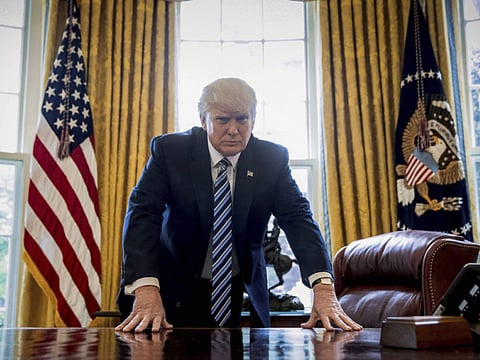Should the Middle East embrace Trump?
This is a good moment to consider not only how the region’s ties with the US have changed since January, but what those changes might mean in the longer term

There is no doubt that many governments in the region believe their relations with Washington have improved under US President Donald Trump. Obama-era restrictions on arms sales to Saudi Arabia and Bahrain have been lifted. Qatar is happy to see the US stepping up its involvement in Syria. Egypt’s Abdul-Fattah Al Sissi was ostracised by former president Barack Obama but recently enjoyed a warm Oval Office reception from Trump.
Outside the Arab world the changes are equally dramatic. Turkey’s Recep Tayyip Erdogan received a congratulatory phone call from Trump after this month’s constitutional referendum — despite opposition moves to contest the results of that vote and a US State Department statement expressing concern at the potentially anti-democratic nature of Erdogan’s constitutional changes. In Israel, the appointment of a US ambassador with a long record of support for the country’s right-wing politicians has dramatically altered the Washington-Tel Aviv diplomatic atmosphere.
The new administration’s rhetorical hard line against Iran has been welcomed by Arabs and Israelis alike, as has the fact that Trump, unlike Obama or George W. Bush, does not have a tendency to lecture the region’s leaders in public (or, by most accounts, in private) about whatever issues might arise between them.
Even the Muslim-focused travel ban that Trump has twice tried to impose during his short time in office and a ban on taking electronics on US-bound flights from the Gulf seems to have done little to dent this growing relationship. In the long run, however, the question is whether this atmosphere can endure and, if it doesn’t, what comes next?
At the risk of stating the obvious: Trump is unpredictable, so positive signs today cannot — and should not — be taken as evidence that the longer-term relationship between the Middle East and this administration will be positive.
This month’s events in Syria should be clear evidence of that. By his own account Trump rethought American relations with Syrian President Bashar Al Assad mostly by himself and mostly on the basis of pictures he saw on television in the wake of the gas attack on Khan Shaikhoun. One may approve of where the administration ended up in policy terms, and even of the decision to launch a missile strike to punish the Al Assad regime for the Khan Shaikhoun attack. But it is also worth asking how regional stability could be affected by a White House prone to abrupt policy reversals based mainly on TV news reports.
Put another way: Middle Eastern governments are understandably happy that so many American policies have changed so dramatically, but the mere fact that all this could happen in so short a time ought to give them pause. Policies that go through one set of abrupt changes can go through another.
It is particularly worth keeping an eye on Trump’s Muslim Travel Ban not only because it is a potentially explosive issue but also because the argument the administration is using to defend it has far-reaching implications.
Specifically, the administration has offered few reasons why seven (later reduced to six) specific countries were on the initial travel ban list. Instead, it has argued, in essence, that the president has the legal authority to ban pretty much anyone he wants from the United States for pretty much any reason. If a win establishes this principle that will mean that countries can be added to the list whenever the administration pleases (or whenever future administrations please, since a court ruling for Trump would expand the power to future presidents as well).
So the question that ought to be asked is not whether the policy changes of Trump’s first 100 days have been good for the Middle East so far, but what their sudden nature implies about the future.
With that in mind, every government in the region should be focusing on its long-term interests vis-a-vis America, as opposed to what it wants out of the new administration this week or next month.
If Trump has demonstrated anything it is a desperate desire to be popular, and a willingness to sacrifice almost any political position in pursuit of what he thinks is likely to shore up support with his base.
A series of early decisions that many in the Middle East find welcome should not blind the region to the fact that Trump is still mostly making things up as he goes along. This plays to his unpredictable nature — but it also hints at a turbulent few years ahead for pretty much everyone who will be dealing with the administration — friend and foe alike.
Gordon Robison, a longtime Middle East journalist and US political analyst, teaches political science at the University of Vermont


